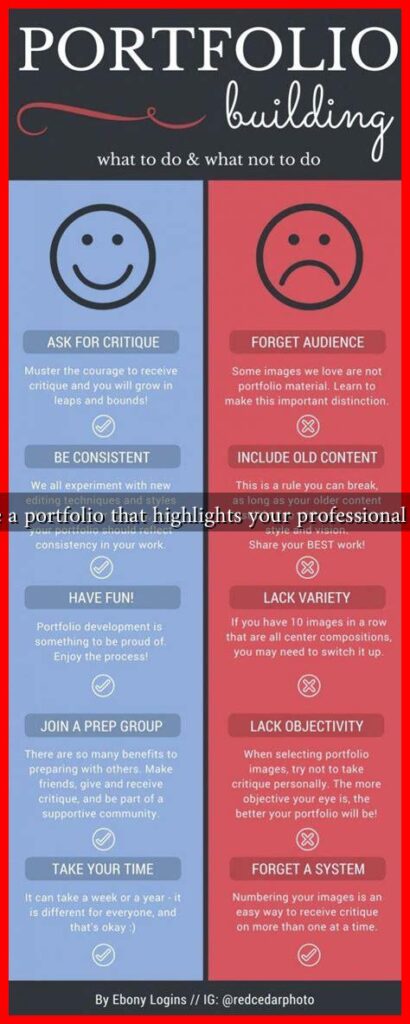-
Table of Contents
How to Create a Portfolio That Highlights Your Professional Independence
In today’s competitive job market, showcasing your professional independence is crucial for standing out. A well-crafted portfolio not only demonstrates your skills and experiences but also reflects your ability to work autonomously and take initiative. This article will guide you through the steps to create a portfolio that effectively highlights your professional independence.
Understanding Professional Independence
Before diving into portfolio creation, it’s essential to understand what professional independence means. It refers to the ability to work independently, make decisions, and take responsibility for your work. This quality is increasingly valued by employers, especially in freelance, remote, and entrepreneurial roles.
Key Elements of a Portfolio
Your portfolio should be a comprehensive representation of your work and capabilities. Here are the key elements to include:
- Introduction: A brief overview of who you are, your professional background, and your areas of expertise.
- Work Samples: Include a variety of work samples that showcase your skills. This could be projects, designs, writing samples, or case studies.
- Testimonials: Gather testimonials from clients, colleagues, or supervisors that speak to your independence and work ethic.
- Skills Section: Highlight specific skills that demonstrate your ability to work independently, such as project management, problem-solving, and self-motivation.
- Professional Development: Include any courses, certifications, or workshops that enhance your independence and expertise.
Showcasing Your Independence Through Work Samples
When selecting work samples, choose pieces that not only demonstrate your skills but also reflect your ability to work independently. Here are some strategies:
- Highlight Solo Projects: Include projects where you were the sole contributor. This could be a freelance project, a personal initiative, or a significant role in a team project.
- Document Your Process: For each work sample, provide a brief description of your process. Explain how you approached the project, the challenges you faced, and how you overcame them independently.
- Use Metrics: Whenever possible, quantify your achievements. For example, “Increased website traffic by 50% through a self-directed SEO strategy.”
Incorporating Testimonials and Endorsements
Testimonials can significantly enhance your portfolio by providing third-party validation of your skills and independence. Consider the following:
- Request Specific Feedback: When asking for testimonials, request that your clients or colleagues focus on your ability to work independently and take initiative.
- Use LinkedIn Recommendations: LinkedIn is a powerful tool for gathering endorsements. Ask for recommendations that highlight your independent work.
- Include Case Studies: Create case studies that detail your independent projects, including the problem, your solution, and the results.
Designing Your Portfolio
The design of your portfolio is just as important as its content. A clean, professional layout can enhance readability and engagement. Here are some design tips:
- Choose a Professional Template: Use platforms like Behance or Adobe Portfolio to find templates that suit your style.
- Maintain Consistency: Use consistent fonts, colors, and layouts throughout your portfolio to create a cohesive look.
- Make It Accessible: Ensure your portfolio is easy to navigate and accessible on various devices.
Conclusion
Creating a portfolio that highlights your professional independence is a strategic way to showcase your skills and attract potential employers or clients. By including key elements such as work samples, testimonials, and a professional design, you can effectively communicate your ability to work autonomously. Remember, your portfolio is not just a collection of your work; it’s a reflection of your professional identity. For more insights on building a compelling portfolio, consider visiting The Balance Careers.
In summary, focus on showcasing your independence through carefully selected work samples, meaningful testimonials, and a polished design. By doing so, you will create a portfolio that not only highlights your skills but also positions you as a self-sufficient professional ready to take on new challenges.

